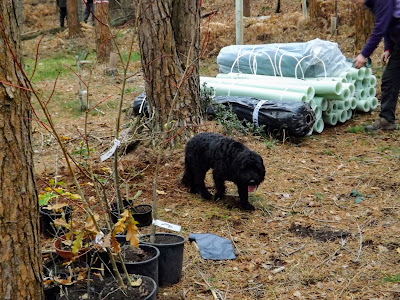 |
| Plumpton students after a day's tree planting and their tutor, Sarah George (far left) |
We wanted to ensure the local provenance of anything we planted at Old Copse, and found two excellent suppliers: Special Branch Tree Nursery, based at Stanmer Park on the outskirts of Brighton, and run by volunteers. Their seed stock is all sourced from Sussex, and grown carefully to provide quality plants. What Special Branch was unable to supply, we bought from English Woodlands near Heathfield, a commercial business which also guarantees good quality trees, mostly locally sourced.
As this was our first go at major planting, we were advised and helped by David Abbott, one of our deerstalkers, who kindly took a day off from his own business to show us how it's done. We also had help from a group of Countryside Management students from Plumpton College, and their tutor, Sarah George. Before coming to Old Copse they had studied our management plan, to understand what we are trying to do. Management Plans aren't obligatory for woodland owners but writing them really helps to focus on the work needed to restore long -neglected woodlands, and, also importantly, enables applications for grant aid. For instance, we were given a grant for writing the management plan, and also grants towards the work. So this, and some future tree planting projects are partly paid for by the Forestry Commission. Thank you F.C.
All 30 acres of Old Copse will need varying degrees of re-stocking eventually, but we decided to begin with the thinned Scots Pine plantation to see how we got on. Some of the planting material, plus tubes, stakes and temporary deer-fencing was delivered by English Woodlands the day before, and we collected our plants from Special Branch a week before that. These had to be 'heeled in' to keep the roots in good condition, in the vegetable plot at home, then lifted and taken to the wood. On Thursday morning David loaded up his quad bike and ferried all the heavy stuff down to the pines, ready to start planting our collection of 400 bare-rooted whips, saplings, and potted young trees. We chose a mix of species, based on what grows naturally at Old Copse and would have been there before it was felled in the late 1950's to make way for the Scots Pine plantation - primarily oak and beech. To these we added hornbeam, sweet chestnut, wild cherry, hazel, lime, and also guelder rose, spindle, dogwood, and a few of the rare native Plymouth Pear, thought to survive in just two wild hedgerows in Plymouth and Truro. Apparently it has an inbuilt control mechanism called self-incompatibility which prevents in-breeding - it produces very little viable seed. (note to self: ask Special Branch where they got their seed from......)
 |
| David demonstrates |
We managed to get nearly everything planted out before dusk around 4pm, leaving about 30 more in pots, plus some barerooted hedge and edging plants to finish up the next day. All in all, it was hard work but a very enjoyable, fun day, and so nice to work in a team with such great people. We reckon that we need roughly another 100 trees to finish this particular piece of work, but now we know the ropes, we'll get those in much faster, and expect to get the job finished during January. We didn't need to use our 100 metres of heavy duty deer fencing this time, but it is sure to come in useful at some point. The next planting project will be in the birchwood after we've done some more felling there.
 |
| Sarah the tutor supervises |
 |
| Herbie works hard, i..e races about like a maniac with all the excitement |
 |
| While Wren guards the quad bike for David |
And to end, a lovely email from Sarah, - Countryside Management tutor at Plumpton College. I somehow think we'll manage to find a few more things for her students to do at Old Copse! Many thanks to Sarah and her students, and to David, for sharing his expertise, and who is, incidentally, an ex -student at Plumpton.
Hello Sue and Sarah
I just wanted to email and thank you for such a brilliant day yesterday. The students absolutely fell in love with your woodland and were completely enchanted with what you are doing there and how you are doing it. From my point of view, they learnt so much simply from working alongside you and David – far more than listening to me or reading from a book. Your delicious soup at lunchtime just sealed the day – thank you so much.
As you heard, many of the students are very keen to come back and see you again so if you have any further work then please do let us know!
With warmest wishes
Sarah
 |
| And the result... |


No comments:
Post a Comment